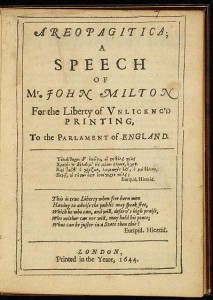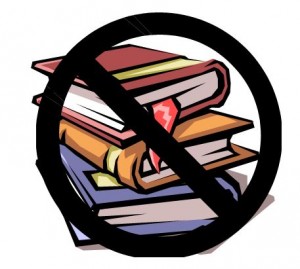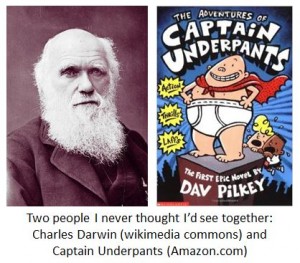Hi there, fellow readers! The American Library Association has designated September 21-27th Banned Books Week, with the goal of bringing attention to banned or “challenged” books. Here’s the Association’s statement of purpose, along with its definition of what constitutes a banned or challenged book:
Each year, the ALA’s Office for Intellectual Freedom compiles a list of the top ten most frequently challenged books in order to inform the public about censorship in libraries and schools. The ALA condemns censorship and works to ensure free access to information.
A challenge is defined as a formal, written complaint, filed with a library or school requesting that materials be removed because of content or appropriateness. The number of challenges reflects only incidents reported. We estimate that for every reported challenge, four or five remain unreported.
Many of us are already familiar with banned books from earlier decades: Twain’s Huckleberry Finn, F. Scott Fitzgerald’s The Great Gatsby, Alice Walker’s The Color Purple, and Harper Lee’s To Kill a Mockingbird, among others. It probably wouldn’t surprise you to know that Charles Darwin’s Origin of the Species (1859) was banned by many institutions when it first came out, although one institution might surprise you: Trinity College in Cambridge, Darwin’s own alma mater. You know you’ve got a controversial book on your hands when your own college bans it. Of course, I have a problem with colleges banning books to begin with, but this is the 19th century we’re talking about. The concept of natural selection turned the Victorian notion of the universe on its head.
It’s a shame John Milton (of Paradise Lost fame) wasn’t around when Darwin’s book was banned. That 17th century poet (who had some of his own writings banned during his lifetime) was a vehement critic of censorship. In 1644 he wrote an anti-censorship treatise, Areopagitica: A Speech of Mr. John Milton for the Liberty of Unlicenc’d Printing, to the Parlament (sic) of England. He was responding to Parliament’s passage of the Licensing Order of 1643, which required all authors to have a government-approved license before publishing their work.

The major premise of Areopagitica is that one cannot know the good without the bad, and truth cannot prevail in the world without the open challenge of other ideas that can be debated and examined. It’s heavy reading, but here are some of my favorite quotes from the essay:
For books are not absolutely dead things, but …do preserve as in a vial the purest efficacy and extraction of that living intellect that bred them.
Many a man lives a burden to the Earth; but a good Book is the precious life-blood of a master-spirit, embalmed and treasured up on purpose to a life beyond life.
I cannot praise a fugitive and cloistered virtue, unexercised and unbreathed, that never sallies out and sees her adversary, but slinks out of the race….
Let her [Truth] and Falsehood grapple; who ever knew Truth put to the worse in a free and open encounter? Her confuting is the best and surest suppressing.
Sadly, when Charles II was restored to the throne, many of Milton’s works were burned and he was arrested (though later freed through influential friends). It would take a long while for Milton’s arguments for free speech, both written and spoken, to take hold in society.
What’s interesting about the current list of banned books is that several of them are in the middle-grade and YA categories: Captain Underpants by Dav Pilkey, The Hunger Games by Suzanne Collins, and Bone by Jeff Smith. The other books on the list often claim the reason for being challenged as “unsuited to age group.” We’ve moved into an era where we are more aware that our children are being exposed to alot of inappropriate material, particularly on the internet. It’s natural to want some control over that. But is making that book unavailable to every child and teen who uses that school’s library the best way to accomplish that? Are my sensibilities as to appropriate reading for my child better than your sensibilities? (Frankly, I’d be delighted if my reluctant reader would willingly pick up a book). I’d love to hear your thoughts on the subject.
So, how will you give a nod to banned books week? Perhaps by looking over some of the lists of books that have been challenged or outright banned throughout history? Reading a previously banned book? Discussing censorship with your peers or your children? All terrific activities, and I’d love to hear from you!
Want to read more?
Banned and Challenged Classics
Censorship in Libraries and Classrooms: Myths and Realities
Captain Underpants tops list of most challenged books in 2013 – CNN.com
Until next time,
Kathy





I perfectly understand the age appropriate desire, but I don’t see that as a reason for banning a book. It’s also interesting that the list was compiled from just 307 complaints. I wish people were more moved to complain about things that really effect society (cancer, diabetes, traffic deaths, and guns, for example) than taking up their right to be indignant over something about which they have a choice.
I’ll get off my soapbox now 😉
Cheers
Nigel
I think a great many of us would be happy to join you on that soapbox, Nigel. While it’s important that people have the opportunity to voice their concerns over something, it’s equally important that a book isn’t pulled from a shelf because of a vocal minority. Thanks so much for stopping by!
I am sick to death of everything being scrutinized and everybody having to be so danged aware of everybody’s else’s “sensibilities.” Since when it is our business to put our nose in anyone else’s business anyway. If everyone minded their own business, we wouldn’t have to worry about hurting anyone else’s feelings. We have taken PC to a whole new level and it is killing creativity and the right to free speech. Let’s just practice common sense and do unto others okay? Sheesh, that method worked for centuries, why must be go changing it now?
My personal motto? If I am overly sensitive to what someone else might have to say, I don’t listen to that person. I stay way. I avoid them. I go elsewhere. Problem solved.
This is a hot button for me, sorry I took that moment to get up on my soapbox.
When I was a child my mother decided which books I was banned from reading – not the school, not “society,” not anyone else. If mom said, “no,” I didn’t read it. (Well I didn’t read it anywhere where she could see me reading it anyway.)
Patricia Rickrode
w/a Jansen Schmidt
I hear ya, Patricia! Unfortunately, censorship and folks butting in for the “common good” is nothing new. 🙁
Great blog about censorship, Kathy — especially about Milton. It sparked my interest regarding book banning: According to a WSJ article 5 years ago, a professor an American University in Lebanon ordered copies of The Diary of Anne Frank for his class — only to be told that it was banned. Also banned in Lebanon: Movies starring Jane Fonda (because she visited Israel years ago)
A favorite author of mine, historian Deborah Lipstadt, has spent much of her career countering Holocaust denial. She has done much to shine the light of day on some very sketchy interpretations of history which are based on scant evidence. She gets frustrated when Deniers’ arguments devolve into rants about free-speech — as though taking them to task for this point or that is a violation of First Amendment freedoms. Unfortunately this is made worse by real censorship of Holocaust denial (enforcement includes jail sentences, which have been carried out). These laws banning books and public speech (in Europe) attempt to silence debate, but only serve to legitimize the perps by providing them with a platform as free-speech advocates. Lipstadt makes a very compelling case about the perils of stifling speech. Aside from the obvious objections, it is counterproductive
That’s really interesting, Bill, and raises a great point about the dangers of censoring debate. Let the crackpots speak and show themselves for who they are. Milton certainly got that right.
I see your and Lipstadt’s point about suppressing those who deny the existence of the Holocaust, and how it has given them more ammunition. Once we perceive something as threatening enough to actively suppress, it already has some control over us. But not only is free speech crucial. Just as important is educating the members of our society so that they are competent critical thinkers, not easily swayed by logical fallacies, appeals to emotion, and bombastic rhetoric.
But I’d better stop here, before I move into “bombastic” territory myself. 😉 Thanks so much for your comment!
Well, I guess I will be giving a nod behind because I totally missed Banned Books Week! I was sick and am just now catching up with visiting blogs. So that’s what I get.
Now, about banned books. How do I feel about this? Hmm. My first thought was that it should be left to the parents or those individuals whose responsibility is to guide and direct children. Then again, for those who don’t have someone to look after them, perhaps it might be a good thing, within reason. But as history has shown, balance is not struck when these actions, such as banning, are taken. Things tend to go to the extreme. In which case, as was mentioned, it becomes counterproductive. So there you go. Thank you Kathy! 🙂
When we’re talking about kids, it is indeed a slippery slope, but I think Jenny makes a good point about kids sort of “self-regulating” in terms of what they can and can’t handle. And there’s so much now digitally available that I worry about way more than what books they might read. As I mentioned earlier, I’d be thrilled if my guys were actually interested in PICKING UP A BOOK…
Glad you’re feeling better, Karen! Thanks so much for stopping by.
I firmly believe that kids will censor themselves. I always did. If I wasn’t ready to read something, I put it down. If I “almost” understood it and wanted to know more, I asked an adult. I think many kids will run straight to the banned list for their reading choices anyway. 🙂
It’s interesting when you look at some of the titles on the list, such as Captain Underpants. One of the reasons it’s popular with kids is that it’s wildly inappropriate, and there’s potty humor. I think some adults are uncomfortable with kids taking delight in such things.
I think I read some books as a kid I could have done with not reading til I was older. Why don’t they have ratings on books like they do on movies? Then parents can say, e.g. their kids can read G and PG books, but not M books til they’re thirteen, or something.
Hi Deborah! It’s an interesting idea, but I wonder if books are a bit more complex in terms of coming up with a rating. Good thing we have the recommendations of librarians, teachers, and other parents, in addition to review sites like Common Sense Media and others.Scholastic’s a good source, too. 😉